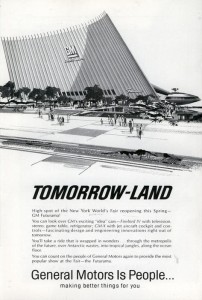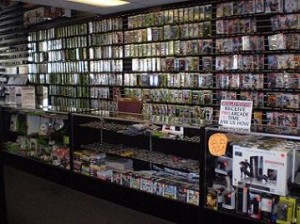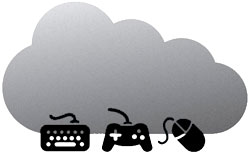Secondhand Gaming: Past, Pirates and Future
by MJG74, HSM Art Director
The forbidding realities of a consumer in an economic downturn has many gamers browsing the barging bins of the used-game isle before considering purchasing a new title.
Video games – particularly those to come out for the major consoles – are expensive, and players see the distinct difference in buying a brand-new game for $50-$60 and buying a used game for significantly less than that. Money talks, and in a tough economy, low-cost pre-owned games scream, “bargain!”
As millions of used titles are sold each year, are our spending habits shaping the future of the gaming industry? The answer may surprise you.
As used games present an opportunity for budget-minded customers, game developers have been vocal about their dislike of used game market. For the developer, each used title sold is one less new title being purchased, which equates to no revenue. In some circles, used game purchasers have been considered akin to a new form of piracy. Piracy is very strong language; nonetheless, used game sales is a topic of great controversy for the developers who make these games.

What has prompted the controversy? After all, secondhand markets are natural offshoots of the mass-consumerism in our culture and a significant factor in our economy. Used cars are the life blood to any small dealership. Who doesn’t know of a good place to buy used books, or even that local independent game store, where you’re able to find the old hardware and rarer titles? Used video game sales are certainly nothing new.
But what is changing? For starters, it is the size of this market — one that has expanded from a local small-town shop to retail sales on a national and international scale. For retailer GameStop, used games equals profits, according to a recent Gamasutra report, GameStop netted $2.28 billion in the first quarter of 2011, and nearly half of their profits are from used game sales.
It is a profitable business plan that has started to attract large corporations from Amazon to Walmart to Best Buy, all looking for their share. As large of a chain as GameStop is, when you add in the top three retail giants to the mix, it is understandable why developers are very concerned over used-game sales.
From EA sports enacting an Online Pass, to THQ locking online play without a code, to Harmonix packaging a onetime use code, game developers and companies have enacted numerous measures to battle the sale of used games. For the consumers comes mixed feelings. Although some may sympathize with the developers, many gamers see these measures to be unfair. Once a disc-based game is purchased, some contend, there should be no extra fees, or deny continued use of content that is installed on that disc. With many changes occurring in the industry, the used games market which these big retailers are so eager to enter may be quickening the final stages of the disc-based game and console life cycle.
Online based game services such as PlayStation Network, Steam, Xbox Live and OnLive represent a distinct change in how users acquire and play games. We are rapidly reaching a point where the video game will be a virtual object, one that has no physical form. Online web-based (like Facebook and others) games graphically went from something that would be playable on an Atari 2600 to PlayStation One in less then a years’ time, and continues to improve very rapidly.
Concurrently, the industry is hinting at streaming game content for any apparatus that can connect to the Internet, through true cloud gaming. Also devices that can connect to the Internet are becoming more accessible, more powerful and less expensive with each product generation. Google Moore’s Law to get an idea of just how much more powerful.
Within the very near future, we will be able to play the newest games with the best graphics, web resident or streaming on our mobile devices. We will play games with only a Bluetooth controller or native on a touch screen. Gone will be our consoles, yet we still will be able to play our games in the comfort of our own homes, by linking our mobile devices to our televisions or TVs that are actually giant tablets. No matter where we are, we will always be able to access our library of games on devices that also satisfy our computing needs.
With the console becoming a thing of the past at some point in the foreseeable future, it opens new and exciting prospects for the game consumer, developer and publishers alike. As gamers, we will be able to experience a larger variety of games, from AAA titles to independents, on a device we already own. For the industry, they will also prosper, as they can now maintain stricter control over distribution of their products, eliminating the need to invest millions in manufacturing and distribution costs. Most important for the current debate: there’s no such thing as pre-owned code, forcing the used games market to potentially go back to the small independent retailer, who is selling to those who are looking for a nostalgic experience.
 Thanks to Sony, we have a sneak peek at what the future of gaming may become, as PlayStation Home presents itself as a model for future gaming. Home is to us as the World’s Fair Tomorrow Land exhibit was to our grandparents and great-grandparents.
Thanks to Sony, we have a sneak peek at what the future of gaming may become, as PlayStation Home presents itself as a model for future gaming. Home is to us as the World’s Fair Tomorrow Land exhibit was to our grandparents and great-grandparents.
“The eyes of the Fair are on the future — not in the sense of peering toward the unknown nor attempting to foretell the events of tomorrow and the shape of things to come, but in the sense of presenting a new and clearer view of today in preparation for tomorrow; a view of the forces and ideas that prevail”
-1939 New York World’s Fair pamphlet
People around the globe are logging into Home and socializing, gaming and being entertained in ways unimaginable just a short time ago. Games like Scribble Shooter, Novus Prime, Sodium, and many others exclusive to Home are proving a great gaming experience does not need to be on a disc nor be expensive. Avatars bring a touch of personality and customization to gaming that lets the gamer become more involved with the gaming experience, as well as being a part of an expanding online community. Virtual items and micro transactions have proven to be a lucrative source of additional income for developers, as well as creating endless possibilities of customization for the consumer.
As video games become more expensive to create, and used games sales are seen by their developers and publishers as income lost, the used game market may be the final nail in the lifespan of disc-and-console-based gaming coffin. Like how the coin-operated arcade was replaced by the console as a showcase of the top games and new advances in graphics, so too will the console be replaced by online gaming. If Home is any indication, we are all in for a very exciting virtual experience that will define generations to come.




Back in the day, a lot of classic games came bundled with “feelies” — something like a codebook, for instance, which you couldn’t complete the game without. Bryan Fargo’s Wasteland is a perfect example of this; it served as a rudimentary form of copy protection.
Today, we see a lot of games offering downloadable content for purchase. These files provide a revenue stream for the developer regardless of whether the game was purchased new or used.
In the future, I fully expect to not really “own” a piece of physical media, but rather pay an acquisition price to download access to gaming experiences I want to enjoy. This, to me, makes perfect sense.
A colleague of mine suggested that the death of the secondary market would give game publishers too much proprietary control — that they could effectively charge whatever they wanted. The catch, I quickly pointed out, is that they can only charge what the market will bear. Price something too low *or* too high, and you don’t get your budgeted ROIC.
With regard to Home, I personally think it’s very, very good for the gaming industry. It’s an opportunity for some unique, thoroughly enjoyable gaming experiences that simply couldn’t be produced any other way, due to the costs involved today. And, at the same time, it provides a template for the industry to study on how to blend social networking and gaming for console users as opposed to exclusively PC users.
Personally, I’m very excited for what the future holds in this industry. I really do feel the next ten years are going to rewrite a lot of the business model that’s used today.
I miss code wheels. Made me feel more “part” of the game. AND I miss the need to make your own maps. that was crazy cool to have to do!
Wonderful article Mike and I agree we are up for some incredible changes in the near future. I have been gaming since they were invented, and it took many years for us to get from Pong to PlayStation 1, and quite a few less than that to get to where we are now. The rate that this technology is speeding ahead is astounding, and I believe that we are going to be on the forefront of this new generation of gaming with Home. Good job explaining everything.
I’ve been watching this for a while and its a bit disturbing in some ways. Namely developers, publishers and companies like sony accusing their customers of piracy for buying used games. In reality they are NOT losing money to used games. people have been selling & trading used games for years privately and at flea markets, and the developers & publishers make their money on first sale. To be honest we’ve not seen a single studio or publisher go bankrupt from used game sales. And some throwing out blatant insults calling used games “immoral” or even calling people buying them “pirates” or “criminals” is very defamatory and not justified.
I shop at Gamestop myself occasionally,not so much for their prices as much as for their selections.You can find older,harder to find games from many different platforms,current generations as well as older 1’s.Until I can get every game from different consoles and era’s downloaded to my PS3 and be able to play it on the PS3 going to Gamestop is the easiest way for me to buy 8-bit nintendo games,not that I buy alot of those but occasionally I run across 1 that I remember from the good old days and I pick it up.